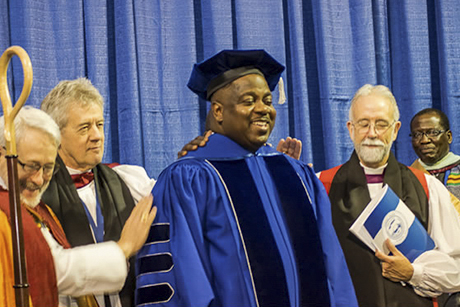 Adapted from ACNS
Adapted from ACNS
Calling on his students and colleagues to “think differently,” W. Franklin Evans was inaugurated April 7 as ninth president of Voorhees College, 120 years to the day when educator Elizabeth Evelyn Wright opened the school for children of former slaves that grew into the college.
“I will uphold the mission established by the founder, as I work to make Voorhees a premier institution of excellence,” Evans said at his inauguration. He has called Voorhees “the hidden jewel of South Carolina.”
The daughter of an African-American father and a Cherokee mother, Elizabeth Evelyn Wright had studied at Booker T. Washington’s Tuskegee Institute in Georgia. In 1890 she moved to rural Hampton County, South Carolina, and tried to start several schools for blacks, despite the surge in racist Jim Crow laws in that decade.
Overcoming arson attacks and sparse funding, she established the Denmark Industrial School, modeled on Tuskegee, above a storefront in 1897. It attracted the attention of New Jersey philanthropists Ralph and Elizabeth Voorhees, who in 1902 donated $5,000 for land and a building. The Voorhees family also established Voorhees College, a historically Anglican institution in Vellore, Tamil Nadu, India.
Today the Voorhees College campus is listed on the National Register of Historic Places, and the Voorhees is one of the ten members of the Association of Episcopal Colleges.
The Episcopal Church is striving to assure the financial future of Voorhees and St. Augustine’s University in Raleigh, North Carolina, as part of its racial reconciliation initiative.
Voorhees is a small college of 600 students in a small town of 3,300 residents, of whom 86 percent are African American and 35 percent live below the poverty line. It cannot pay faculty and staff salaries to match those of larger institutions. Enrollment has been declining. The last decade has seen shrinkage in federal scholarship funds for low-income students.
But Voorhees may be able to benefit from the surge of interest in the country’s 107 historically black colleges and universities, which were established before 1964 to serve the African American community.
Evans previously served as interim president of South Carolina State University, where he also had been provost and chief academic officer, responsible for faculty recruitment, strategic planning, and re-accreditation. His top priorities are boosting enrollment and encouraging greater alumni support.
His inauguration occurred before an audience of 500. The Rt. Rev. Gladstone (Skip) Adams of the Episcopal Church in South Carolina preached, and the Rt. Rev. Andrew Waldo of the Diocese of Upper South Carolina celebrated the Eucharist.
Bishop Adams turned Psalm 78’s question — “Can God spread a table in the wilderness?” — to the College. “Can Voorhees be an altar, that is, a sacred table set by God around which God’s good people are gathered?” Drawing on the language of Presiding Bishop Michael Curry, he asked: “Can Voorhees be part of the Jesus Movement in this time and place, in the wilderness and the culture in which we live?”
Representing the nine other presidents of the Association of Episcopal Colleges, the Rev. Canon James G. Callaway recounted to Evans the distinctive ways each had been founded since 1822. “Each was founded to minister to a particular social need with compassion, vision, and service. Now, sir, we invite you to join in writing the next chapter in Voorhees College’s distinctive witness of ‘changing minds, changing lives.’”
The Association of Episcopal Colleges is the American chapter of the Colleges & Universities of the Anglican Communion, a worldwide network of 150 Anglican colleges and universities that exists for the mutual flourishing of its members.
Related reading: “Pressing On in the Carolinas” by G. Jeffrey MacDonald.
From left in image: Andrew Waldo, Jamie Callaway, W. Franklin Evans, Gladstone (Skip) Adams, and Willie Jefferson.









